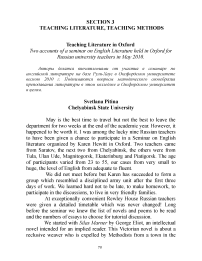Teaching literature in Oxford
Автор: Pitina Svetlana, Gorbunova Olga, Lipchanskaya Irina
Журнал: Тропа. Современная британская литература в российских вузах @footpath
Рубрика: Teaching literature, teaching methods
Статья в выпуске: 4, 2010 года.
Бесплатный доступ
Two accounts of a seminar on English Literature held in Oxford for Russian university teachers in May 2010.
Короткий адрес: https://sciup.org/147228673
IDR: 147228673
Текст научной статьи Teaching literature in Oxford
Svetlana Pitina Chelyabinsk State University
May is the best time to travel but not the best to leave the department for two weeks at the end of the academic year. However, it happened to be worth it. I was among the lucky nine Russian teachers to have been given a chance to participate in a Seminar on English literature organized by Karen Hewitt in Oxford. Two teachers came from Saratov, the next two from Chelyabinsk, the others were from Tula, Ulan Ude, Magnitogorsk, Ekaterinburg and Piatigorsk. The age of participants varied from 23 to 55, our cases from very small to huge, the level of English from adequate to fluent.
We did not meet before but Karen has succeeded to form a group which resembled a disciplined army unit after the first three days of work. We learned hard not to be late, to make homework, to participate in the discussions, to live in very friendly families.
At exceptionally convenient Rewley House Russian teachers were given a detailed timetable which was never changed! Long before the seminar we knew the list of novels and poems to be read and the numbers of essays to choose for tutorial discussion.
We started with Silas Marner by George Eliot, an intellectual novel intended for an implied reader. This Victorian novel is about a reclusive weaver who is expelled by Methodists from a town in the
North of England. He sets up in Raveloe, loses gold he collects, finds and brings up a golden-haired baby in place of gold coins, and is finally integrated with the social life. Karen gave a Master-class on teaching literature within its historical and cultural context, explained the details which would not be noticed by the Russian readers of the novel. Every word and every line of the selected paragraphs mattered. We discussed Reformation, Protestantism, role of village church in people’s life, types of houses in the country, the plot and characters...
On Thursday I could visualize it all. I saw the picturesque views of some beautiful parts of Cotswolds in Oxfordshire: thatched houses of very neat villages, old churches of Swinbrook, Asthall, Burford, spectacular blooming fields, dry walling, grazing static sheep and cows, old dovecote in Minster Lovell. Silas Marner’s time grew closer and became more understandable.
Olga Gorbunova and Irina Lipchanskaya Saratov State University
To get a different prospective on English drama we had a lecture on the topic of The Modern London Stage. We learned that London dramatic art is active, lively, interesting and controversial as ever, featuring traditional plays as well as modern ones, which are daring and thought-provoking. And it was very informative for a Russian guest: you can buy and read a book published in London, but you can’t visit a play (unless you are in London, of course). We found it very useful to know about what’s new on stage.
The lecturer on Thomas Hardy’s Poetry chose a very different way: he followed the evolution of main themes and ideas and produced an insightful, very substantial account of Hardy’s life and work. This lecture set a perfect example of how poetry by a single author should be analyzed. It’s essential to single out different topics and pivotal themes around which several poems are organized, yet it’s important to approach poetry as a heritage of one person and to see intertextual play and dominant moods.
The lecture on Modernism and the Modernist novel (Joyce, Woolf and Lawrence) paid attention to the choice of the language and mode of the narration explaining a very complex concept of modernism through detail. That’s really amazing how easily we could understand what the basic principles of modernist art are if we saw the way their texts are made. The lecturer illustrated this point, explaining the workings of free indirect discourse employed by the modernist writers to capture subtle processes of human consciousness.
And of course we had a series of seminars with Karen Hewitt where we looked at the texts closely by analyzing their particular themes, scenes and imagery. These classes gave us a better understanding of particular texts and British culture and tradition in general. Carefully and thoroughly, we went from page to page, (or from line to line if it was a poem), discovering the beauty of the original text. We would say that it was an attempt at close reading, but probably terminology is unnecessary here. And, as we expected, we compared a lot. We thought about Russian style and English style of dealing with text. We were not looking for the ‘English character’ in George Eliot’s or Graham Swift’s novels, but we felt something like it.


